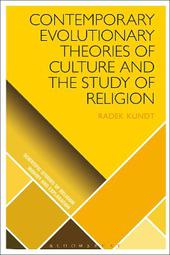
|
Contemporary Evolutionary Theories of Culture and the Study of Religion
Paperback / softback
Main Details
Description
Radek Kundt compares the notion of evolution in cultural evolutionary theories with neo-Darwinian evolutionary theory to determine the value of the biological concept for studying culture. Contemporary Evolutionary Theories of Culture and the Study of Religion surveys the historical background of cultural evolution as used in the study of religion, pinpointing major objections to classical nineteenth-century theories. Radek Kundt argues that contemporary theories of cultural evolution do not repeat the same mistakes but that when they are evaluated in terms of fitting the core requirements of neo-Darwinian natural selection, it is clear that they are not legitimate extensions of neo-Darwinian theory. Rather, they are poor metaphors and misleading analogies which add little to conventional cause-and-effect historiographical work. This book also introduces an alternative evolutionary approach to the study of culture which does not claim that the principles of neo-Darwinian evolution should be applicable outside the biological domain. Radek Kundt shows that this alternative evolutionary approach nevertheless provides a deeply enriching line of enquiry that incorporates both biological evolutionary history as shaping cultural change and culture as a force acting on the gene.
Author Biography
Radek Kundt is Assistant Professor in the Department for the Study of Religions, Masaryk University, Czech Republic, where he also acts as Director of LEVYNA - Laboratory for the Experimental Research of Religion.
ReviewsIn this erudite work Radek Kundt expertly guides us through the thickets of evolutionary theory as this is applied to cultural forms in general and religious behavior in particular. His critical analyses are accurate and compelling, his descriptions of the various approaches instructive, and his suggestions productive. We are all in his debt. -- E. Thomas Lawson * Journal of Cognition and Culture * Wonderful and badly needed ... The value of Kundt's book can hardly be overestimated ... A wonderful book, most learned, and desperately needed according to the demands of multidisciplinarity. * Religio * It is a book that will help to clear the fog surrounding the use of evolutionary thought mainly in the field of the study of religion. Its clarity and analytical power will be much appreciated by every scholar who aspires to interweave his or her study of religion with an understanding of the biological, evolutionary underpinnings of humanity and their relevance to culture. * Journal for the Cognitive Science of Religion * Scholars of religion will appreciate Kundt's contribution, as will anyone interested in the scientific (evolutionary) study of culture. It comes with the much-needed theoretical clarifications and classifications of the theory of evolution in relation to culture and defines the standards for its proper use ... Particularly intriguing are Kundt's remarks regarding the influences on the scientific process itself that are happening "behind the scenes" - be they personal biases, ideological abuses or funding scheme agendas. I thus recommend this text for all academics wanting to engage in a serious discussion about evolutionary theorizing and its role and place in the study of human cultural behaviour. * Journal of Cognitive Historiography * Embodying the scientific ideals of current generations, Kundt attempts to transform cultural and religious studies into informed and competent human sciences. His insightful, well-argued introduction to and criticisms of classical and contemporary evolutionary theories is a wake-up call against complacency in a field that is ever-more crucial in contemporary affairs. -- Armin W. Geertz, Director of the Study of Religion Research Program and the Religion, Cognition and Culture Unit, Department of the Study of Religion, Aarhus University, Denmark
|